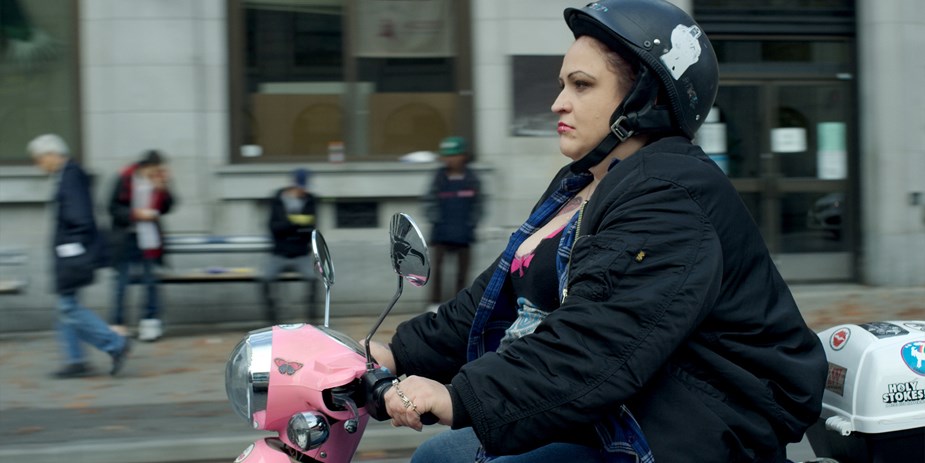Őż
Most longtime Vancouverites can recall where they were (and how they celebrated) when the Canadian men‚Äôs hockey team won the gold medal at the ¬ť∂Ļīę√Ĺ”≥Ľ≠2010 Winter Olympics.
Maybe your memory involves kegs of beer, or honking horns, or high-fiving strangers on the street, hands clad in red mittens. Maybe you remember waving a flag; maybe you don’t remember much at all except that you had fun.
But not everyone had reason to celebrate on February 28, 2010, or were privileged enough to find anything fun about those 16 days of Olympic activity and patriotism. In ≥Ę≥‹įž‚ÄôL≥‹įž‚ÄôI, filmmaker Wayne Wapeemukwa takes audiences back to February 28, 2010, to experience the day from within the lives of a handful of marginalized citizens living on Vancouver‚Äôs Downtown Eastside.
The jarring, sometimes surreal, and unapologetic narrative feature film ‚Äď which won the award for Best Canadian First Feature at the 2017 Toronto International Film Festival last month, and screens this week as part of the 2017 ¬ť∂Ļīę√Ĺ”≥Ľ≠International Film Festival ‚Äď takes its name from the Coast Salish word for the area now widely known as the Downtown Eastside.
‚ÄúWhat we call the Downtown Eastside is for us only a couple of centuries old, but for the Tsleil-Waututh, Squamish, and Musqueam peoples, it‚Äôs been an international venue for thousands of years, and that‚Äôs what I‚Äôm attempting to isolate with the title,‚ÄĚ says Wapeemukwa in a recent phone interview.
Wapeemukwa remembers the ¬ť∂Ļīę√Ĺ”≥Ľ≠2010 Winter Olympics as a time ofŐż ‚Äúcompartmentalization within the city,‚ÄĚ he says. ‚ÄúThe games were supposed to solicit equality, inclusion, and the coming together of many different nations,‚ÄĚ but the patriotism and enthusiasm that Wapeemukwa saw on TV was in direct contrast to the militarism, emptiness, and struggles he witnessed on the streets. ‚ÄúThat got me thinking about the way in which patriotism, specifically here in this country, may be solicited to provide a false sense of inclusion that‚Äôs founded on an even deeper reality of marginalization,‚ÄĚ says Wapeemukwa.
≥Ę≥‹įž‚ÄôL≥‹įž‚ÄôI (pronounced ‚Äúluck-lucky‚ÄĚ) builds on that deeper reality. Wapeemukwa collaborated with his cast ‚Äď Angel Gates, Eric Buurman, Joe Dion Buffalo, Ken Harrower, and Ms. Rollergirl ‚Äď to craft a feature that magnifies the marginalization and highlights the contradictions.
Here‚Äôs the official synopsis from TIFF: ‚ÄúAngel Gates (playing herself) is a mother and part-time sex worker. Eric Buurman (playing himself) is a father juggling his son and landscaping job with his heroin addiction. Angela "Rollergirl" Dawson (also playing herself) is a larger-than-life street celebrity roller-skating around town and interacting with virtually all of Vancouver. Mark (Joe Dion Buffalo) has recurring visions of being taken away to another world. As with many in Mark's orbit, drugs continue to isolate him while doing the dirty job of pushing him further into a system that keeps him exactly there. And there's Ken (Ken Harrower), a disabled man just trying to make it on his own and get to the hockey finals.‚ÄĚ
It took this village of collaborators to bring ≥Ę≥‹įž‚ÄôL≥‹įž‚ÄôI to the screen. ‚ÄúOne of the questions I get asked frequently is, ‚ÄėWhat gives me the right to tell this story?‚Äô And the way I answer is, ‚ÄėWell, nothing does, and that‚Äôs why I placed these people in the front seat,‚Äô‚ÄĚ says Wapeemukwa. The five non-professional actors offered scenarios and insights from their own lives, improvised much of the dialogue, and received story credits on the film.
‚ÄúIt‚Äôs not me telling the story; it‚Äôs the actual non-professional actors and non-actors from the Downtown Eastside who are telling their own story through me,‚ÄĚ says Wapeemukwa, adding that ‚Äúthis mode of writing and collaboration lent itself to the hybrid form of the movie, which is a real story about real people, and we‚Äôre talking about real problems.‚ÄĚ
Despite winning big at TIFF, Wapeemukwa ‚Äď whose short film credits include Srorrim, Balmoral Hotel, ≥Ę≥‹įž‚ÄôL≥‹įž‚ÄôI: Mother, and Weeper: Father ‚Äď describes his time at Canada‚Äôs biggest film fest as ‚Äúa gruesome and excruciating experience‚ÄĚ from day one, because ‚ÄúI knew what was around the corner: There were going to be charges of exploitation. I knew that I was going to be criticized for appropriation, but I also knew in my heart that I did everything that I needed to do to provide this movie with the honesty, integrity, trust, and love upon which it is founded.‚ÄĚ He calls his award for Best Canadian First Feature a ‚Äúsurprise, and I thought at first it was a joke.‚ÄĚ
Wapeemukwa has far different feelings about this week‚Äôs VIFF screenings, although they‚Äôre not altogether pleasant. ‚ÄúUnlike in Toronto, I know for a fact that at least 99% of my audience has actually at one point or the other interacted with the Downtown Eastside in good ways or bad ways, so all of these feelings of doubt and anxiety are amplified for me at this moment, but I think that‚Äôs a good thing because this movie does belong here in Vancouver.,‚ÄĚ says Wapeemukwa.
And he also accepts that not everyone is going to like ≥Ę≥‹įž‚ÄôL≥‹įž‚ÄôI. ‚ÄúThis movie is going to split audiences, and it‚Äôs intended to do so as a matter of fact, because I do believe today more than ever that our diversity is what will lend us our strength in the future,‚ÄĚ says Wapeemukwa. ‚ÄúWhat I‚Äôm trying to do is inspire real conversation about real problems that we should be having.‚ÄĚ
≥Ę≥‹įž‚ÄôL≥‹įž‚ÄôI screens October 3 and 8 at the Rio Theatre as part of the 2017 ¬ť∂Ļīę√Ĺ”≥Ľ≠International Film Festival. Tickets and schedule information at


